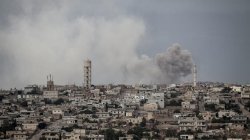Amid a successful offensive of the Syrian army further into Idlib province the fighter groups attempted to prepare a new chemical provocation.
Sources in Idlib province based near a camp of the Hayat Tahrir al Sham terrorist group said that a group of fighters, up to 15, had made a failed attempt on March 2 to detonate munitions alongside the containers with chemicals.
According to the local sources, the fighters who didn't have sufficient skills to deal with such type of ammunition have provoked a leak of chemicals and haven't managed to carry out an explosion. Thus, attempted diversion failed. Moreover, as a result the fighters who were taking part in preparation of a chemical attack have got serious burns and poisonings.
At the same time it is not the first time when fighters try to stage a provocation to blame government troops for. The behavior of fighters is quietly predictable and obviously indicates their desire to accuse by all means the Syrian authorities of the use of the chemical weapon against the civilian population.
In attempt to stop the advance of Syrian government forces in Idlib the armed groups expect that by playing the chemical card, they will be able to inspire leaders of the western countries to take drastic military measures against Damascus.
It is obvious that the militants who found themselves in a catastrophic situation in the northwest of Idlib suffer essential losses and lack of arms and ammunition necessary for countering the Syrian army. Though Turkey provides a wide military support for the armed factions, extremists are forced to hand over positions and to resort to such ways of combat, hoping for the help of the western countries.
It should be noted that after the loss of control over strategically important city of Saraqib located on the crossroad of the highways M-4 (Aleppo Latakia) and M-5 (Aleppo Damascus), fighters are concerned by the possible advance of the Syrian army deeper into Idlib countryside. They seek not to prevent further loss of territories in all possible ways in spite of the fact that the civilians are the first who suffer from their violence.
Sources in Idlib province based near a camp of the Hayat Tahrir al Sham terrorist group said that a group of fighters, up to 15, had made a failed attempt on March 2 to detonate munitions alongside the containers with chemicals.
According to the local sources, the fighters who didn't have sufficient skills to deal with such type of ammunition have provoked a leak of chemicals and haven't managed to carry out an explosion. Thus, attempted diversion failed. Moreover, as a result the fighters who were taking part in preparation of a chemical attack have got serious burns and poisonings.
At the same time it is not the first time when fighters try to stage a provocation to blame government troops for. The behavior of fighters is quietly predictable and obviously indicates their desire to accuse by all means the Syrian authorities of the use of the chemical weapon against the civilian population.
In attempt to stop the advance of Syrian government forces in Idlib the armed groups expect that by playing the chemical card, they will be able to inspire leaders of the western countries to take drastic military measures against Damascus.
It is obvious that the militants who found themselves in a catastrophic situation in the northwest of Idlib suffer essential losses and lack of arms and ammunition necessary for countering the Syrian army. Though Turkey provides a wide military support for the armed factions, extremists are forced to hand over positions and to resort to such ways of combat, hoping for the help of the western countries.
It should be noted that after the loss of control over strategically important city of Saraqib located on the crossroad of the highways M-4 (Aleppo Latakia) and M-5 (Aleppo Damascus), fighters are concerned by the possible advance of the Syrian army deeper into Idlib countryside. They seek not to prevent further loss of territories in all possible ways in spite of the fact that the civilians are the first who suffer from their violence.


